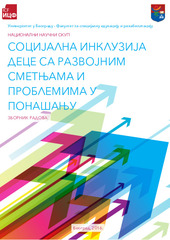Приказ основних података о документу
Dnevni boravak kao mera unapređenja socijalne inkluzije dece i mladih sa problemima i poremećajima ponašanja
Day care as a measure of improving social inclusion of children and youth with problems and disorders of behaviour
| dc.contributor | Jugović Aleksandar | |
| dc.contributor | Japundža-Milisavljević Mirjana | |
| dc.contributor | Grbović Aleksandra | |
| dc.creator | Ilić, Zoran | |
| dc.creator | Marković, Ljiljana | |
| dc.creator | Maljković, Marija | |
| dc.date.accessioned | 2021-06-17T13:24:59Z | |
| dc.date.available | 2021-06-17T13:24:59Z | |
| dc.date.issued | 2016 | |
| dc.identifier.isbn | 978-86-6203-089-4 | |
| dc.identifier.uri | http://rfasper.fasper.bg.ac.rs/handle/123456789/2547 | |
| dc.description.abstract | Deca i mladi sa problemima i poremećajima u ponašanju često su izolovana i odbačena kako od strane vršnjaka, tako i od siste- ma (obrazovnog) i svoje mesto pronalaze na ulici. Njihove porodice najčešće nemaju razvijene veštine kako da se nose sa teškoćama koje ih prate. Na ovaj način mladi ljudi postaju izolovani i isključeni iz društva. U tom smislu, socijalna inkluzija dece i mladih sa problemima u ponašanju treba da se razvija u pravcu po- zitivnog pristupa ovoj grupi gde bi svi sistemi bili umreženi na način koji bi doprineo njihovoj boljoj reintegraciji u društvo, a pre svega u vaspitno-obrazovni proces. Uključivanje resursa iz lokalne zajednice i umrežavanje istih sa svim sistemima, pre svega sa organom starateljstva i školom, je važan deo podrške za ovu grupu dece i mladih i njihove porodice | |
| dc.description.abstract | Children and young people with behavioral problems are often isolated and rejected by both peers and the system (education) and they find its place on the street. Their families usually do not have developed the skills to cope with the difficulties that accompany the children and young people with behavioral problems. In this way these young people become isolated and excluded from the society. In this sense, social inclusion of children and young people with behavioral problems should be developed in the direction of a positive approach to this group of children where all systems should be networked in a way that would contribute to better reintegration of children and young people in society, and especially in the educational process. The inclusion of resources from the local community and networking them with all systems, especially with the guardianship authority and the school is an important part of the support for this group of children and their families. | |
| dc.language | sr | |
| dc.publisher | Univerzitet u Beogradu – Fakultet za specijalnu edukaciju i rehabilitaciju/ University of Belgrade – Faculty of Special Education and Rehabilitation | |
| dc.rights | openAccess | |
| dc.rights.uri | https://creativecommons.org/licenses/by-sa/4.0/ | |
| dc.source | Zbornik radova - Nacionalni naučni skup, „Socijalna inkluzija dece sa razvojnim smetnjama i problemima u ponašanju”, Beograd, 6. decembar 2016 | |
| dc.subject | socijalna inkluzija | |
| dc.subject | deca | |
| dc.subject | mladi | |
| dc.subject | poremećaji ponašanja | |
| dc.subject | social inclusion | |
| dc.subject | kids | |
| dc.subject | youth | |
| dc.subject | behavioral disorders | |
| dc.title | Dnevni boravak kao mera unapređenja socijalne inkluzije dece i mladih sa problemima i poremećajima ponašanja | sr |
| dc.title | Day care as a measure of improving social inclusion of children and youth with problems and disorders of behaviour | |
| dc.type | conferenceObject | |
| dc.rights.license | BY-SA | |
| dc.citation.epage | 129 | |
| dc.citation.other | : 123-129 | |
| dc.citation.spage | 123 | |
| dc.identifier.fulltext | http://rfasper.fasper.bg.ac.rs/bitstream/id/6376/Untitled12.pdf | |
| dc.identifier.rcub | https://hdl.handle.net/21.15107/rcub_rfasper_2547 | |
| dc.type.version | publishedVersion |


